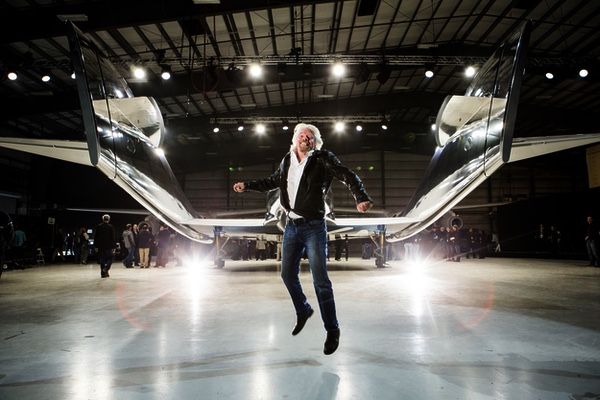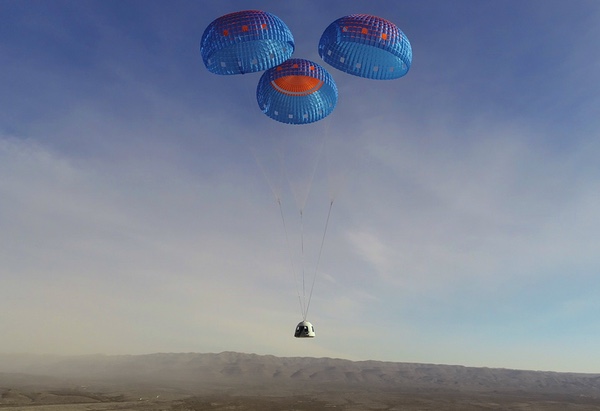Is a billionaire space race good for the industry?by Jeff Foust
|
| “To see the Earth from space, it changes you,” Bezos said. “I want to go on this flight because it’s a thing I wanted to do all my life.” |
The live auction capped off a process that started May 5, when Blue Origin announced it would make its first crewed New Shepard flight on July 20. One of the seats would be auctioned off, with the proceeds going to Club for the Future, a STEM nonprofit affiliated with Blue Origin. At the time of the announcement, the company did not disclose who else would fly with the auction winner in a capsule that can accommodate up to six people.
The auction started with sealed bids, and then a more open online bidding process. A week before the live auction the high bid had been sitting for some time at $2.8 million: a hefty premium over the likely ticket price for regular flights—which Blue Origin has still not released—given that this will be the first flight of New Shepard to carry people.
What drive the auction to its mesospheric heights can likely be explained by a single person: Jeff Bezos. In an Instagram post June 7, Bezos announced that he would also be on that first flight, taking along with him his younger brother, Mark. (A fourth person, whose identity has not been disclosed yet by Blue Origin, will accompany the Bezos brothers and the auction winner.) By the time the online portion of the auction closed Thursday, the high bid had increased to $4.8 million, setting up for the frenzy of the live auction on Saturday.
It is hard otherwise to justify how a seat on a suborbital flight, lasting about ten minutes from liftoff to capsule landing and going to an altitude of a little more than 100 kilometers, could justify such a high price. By comparison, the best estimates for a trip to the International Space Station on a SpaceX Crew Dragon flight lasting more than week are in the range of $50–55 million. Being on the first New Shepard flight would command some premium, but being on the first flight along with the world’s richest man, with whom the winner will presumably spend several days of training before the brief flight? Priceless—or $28 million; close enough.
Bezos’ announcement of going on the flight and the auction generated tremendous press for Blue Origin, although it’s unclear how the company will capitalize on it. Company officials said in May, when they announced plans for the flight, that they were not ready yet to release details on ticket sales, including prices. The company expects to do a few more flights of New Shepard this year.
| Michael Colglazier, CEO of Virgin Galactic, said it was important for both his company and Blue Origin to be successful “because it will normalize the idea of human spaceflight to the market.” |
Ariane Cornell, director of astronaut and orbital sales at Blue Origin, said during the auction webcast that nearly 7,600 people from 159 countries registered to bid on the auction, a pool of potential future customers for the company. “We will also find additional astronauts who will fly on our other upcoming early missions,” she said. “Following the auction, we are going to contact the most competitive bidders from today to offer them access to those early flights.”
The announcement and the auction seem to have stimulated a new round of space billionaire competition. Bezos, who had not previously talked about flying to space, said in his video that flying to space has been a dream of his since childhood. “To see the Earth from space, it changes you,” he said. “I want to go on this flight because it’s a thing I wanted to do all my life.”
 Virgin Galactic founder Richard Branson has long stated he would be on one of SpaceShipTwo’s first flights, and his chance to fly may finally be here. (credit: Virgin Galactic) |
Richard Branson, founder of Virgin Galactic, has been far more open about his spaceflight ambitions, having long talked about being on the first commercial SpaceShipTwo flight, possibly with members of his family. The company, in a schedule last updated during an earnings call in May, said that Branson would fly on the third of four SpaceShipTwo flights the company planned through the fall from Spaceport America in New Mexico, after two test flights with company personnel on board and before a commercial flight for the Italian Air Force.
That earnings call came a few days after Blue Origin announced it would perform its first crewed flight in July. Michael Colglazier, CEO of Virgin Galactic, said it was important for both his company and Blue Origin to be successful “because it will normalize the idea of human spaceflight to the market.”
He downplayed any competition between the two companies when an analyst asked him about schedules. “We have a company being built over years and decades, as does Blue,” he said. “While I think there will be great media attention around both moments when we are going up into space, I don’t think it matters to our business overall.”
That thinking may have changed. Virgin Galactic made the first of those four test flights May 22 with pilots CJ Sturckow and Dave Mackay at the controls of VSS Unity. The vehicle flew to a peak altitude of nearly 90 kilometers—above the 50-mile demarcation where US government agencies award astronaut wings, but below the 100-kilometer Kármán Line—before safely landing back at Spaceport America.
“We hit it as near-perfect as you can in flight test,” Mike Moses, president of space missions and safety at Virgin Galactic, said in an interview hours after the flight. “It was executed as near to the plan as you could hope for. It was a great flight.”
That confidence, and that competition, may be spurring Virgin Galactic to change its plans. Its next SpaceShipTwo flight is supposed to fly two pilots along with four company employees, who will test out the cabin, playing the role of future space tourists.
| “I’ve got a real problem with the authorization of $10 billion going to somebody who, among other things, is the wealthiest person in this country,” Sanders said of a provision in a NASA authorization bill that he claimed benefits Blue Origin. |
However, Parabolic Arc reported June 7 that Virgin Galactic is now thinking about moving up the flight with Branson to be the next mission, launching perhaps over the July 4 holiday weekend. That plan, said an unnamed source, depends on winning approvals from the FAA, which licenses both SpaceShipTwo and New Shepard.
Virgin Galactic said in a statement the next day that it has not scheduled its next test flight, as it’s still analyzing the data from last month’s flight. However, the company neither confirmed nor denied the claim that it’s considering flying Branson on its next mission.
Despite the lack of confirmation from Virgin Galactic, or even other anonymous reports backing the original story, much of the media and the public has latched onto the idea of a race between the two companies to see which of their billionaire founders will go to the edge of space first. (Neither Branson nor Bezos will be the first billionaire in space; Charles Simonyi, an early Microsoft executive, holds that distinction for his two flights to the ISS in 2007 and 2009 purchased through Space Adventures.)
Such a competition, even a perceived one, could help bolster interest in a part of the space industry that has increasingly been overshadowed. Suborbital space tourism was supposed to be the steppingstone that opened the broader space economy because of the large number of payloads—people—who could fly in space, driving economies of scale that the space industry had lacked. Peter Diamandis, whose Ansari X PRIZE started the suborbital space race a quarter-century ago, often joked that suborbital vehicles would fly carbon-based self-loading payloads you can make at home.
The space industry, though, went in a different direction, thanks to innovation in orbital launch by SpaceX in particular and the rise of smallsats, including constellations of such spacecraft. Those constellations now offer the scale needed for investments in reusability to pay off, lowering the cost of launch. (Diamandis, meanwhile, has moved on from suborbital spaceflight, most recently hawking bitcoin as the currency of the future.)
SpaceX also leveraged NASA’s requirement for post-shuttle human spaceflight, and the funding the agency provided, into Crew Dragon. That spacecraft has now flown more people to orbit—ten people on three missions since May 2020—than SpaceShipTwo has done suborbitally since December 2018, with seven people on three flights, including two who have flown twice. SpaceX has on its manifest not just future NASA missions to the ISS but also four Axiom Space commercial ISS missions and other orbital missions for the Inspiration4 project and Space Adventures.
A short-lived race between Branson and Bezos, then, might stimulate demand for suborbital spaceflight for those who can’t afford a Crew Dragon seat or can’t win a contest for one. Blue Origin’s nearly 7,600 bidders is a good start, but it’s not clear how many actually have the means to pay several hundred thousand dollars for a flight.
Billionaires, though, aren’t the most popular people these days. A recent ProPublica report, based on IRS documents it obtained, showed that both Bezos and Elon Musk, among other ultra-wealthy people, paid little or no federal income taxes for years. Both have been criticized for seeing their net worth swell during the pandemic while employees and their families struggled. (Musk has stayed out of the competition between Bezos and Branson, having expressed an interest in going to space some day but not in a rush to do so immediately.)
| Will the public be excited about two people potentially racing each other to space? Or will they see it as another sign of how the wealthy—and potentially the broader space industry—are disconnected from reality? |
Bezos has also been criticized for lobbying for federal funding for Blue Origin. A provision in a NASA authorization bill, tucked into the US Innovation and Competitiveness Act (formerly the Endless Frontier Act) would require NASA to select a second Human Landing System company, authorizing just over $10 billion for the overall program between fiscal years 2021 and 2025. That would be shared between SpaceX’s existing $2.9 billion award and the second company, and would depend on annual appropriations.
This was criticized as a “Bezos bailout” since many argued that Blue Origin would be the most likely recipient of a second award that NASA, under the bill, would make 60 days after it became law. “I’ve got a real problem with the authorization of $10 billion going to somebody who, among other things, is the wealthiest person in this country,” Sen. Bernie Sanders (I-VT) said on the Senate floor last month. Sanders, a socialist, found common ground with conservative senators like Rand Paul (R-KY), who also opposed the provision. However, Sanders’ amendment to strip the HLS language from the bill never got a vote, and the bill passed by a wide margin last week.
Will the public be excited about two people potentially racing each other to space? Or will they see it as another sign of how the wealthy—and potentially the broader space industry—are disconnected from reality amid concerns about the economy, income inequality, climate change, and other pressing near-term issues? How that plays out in the next several weeks could have ramifications far beyond Blue Origin and Virgin Galactic.
As for those bargain hunters, maybe one day, if everything works out for Blue Origin, seats will go on sale during an Amazon Prime Day promotion.
Note: we are using a new commenting system, which may require you to create a new account.
